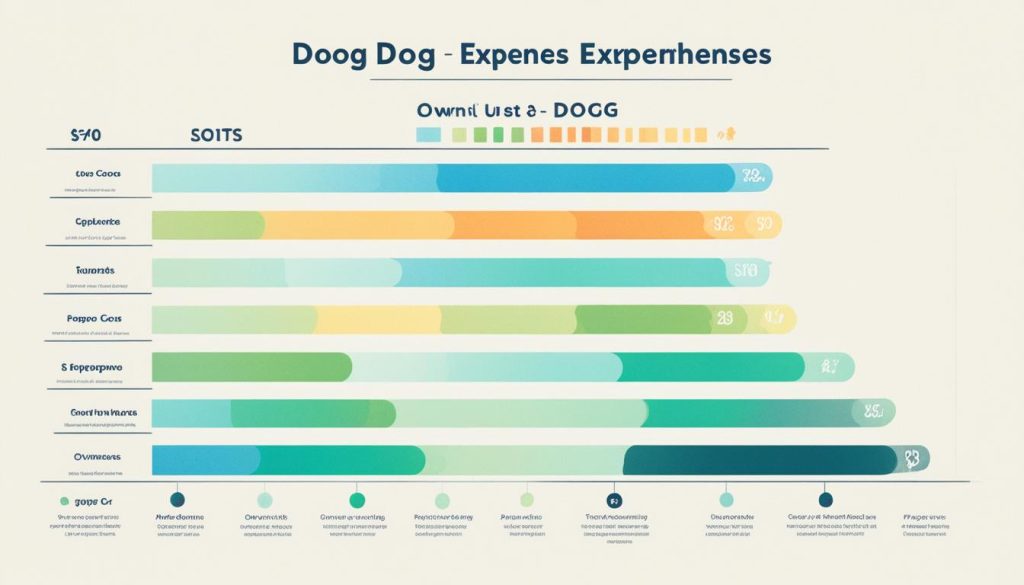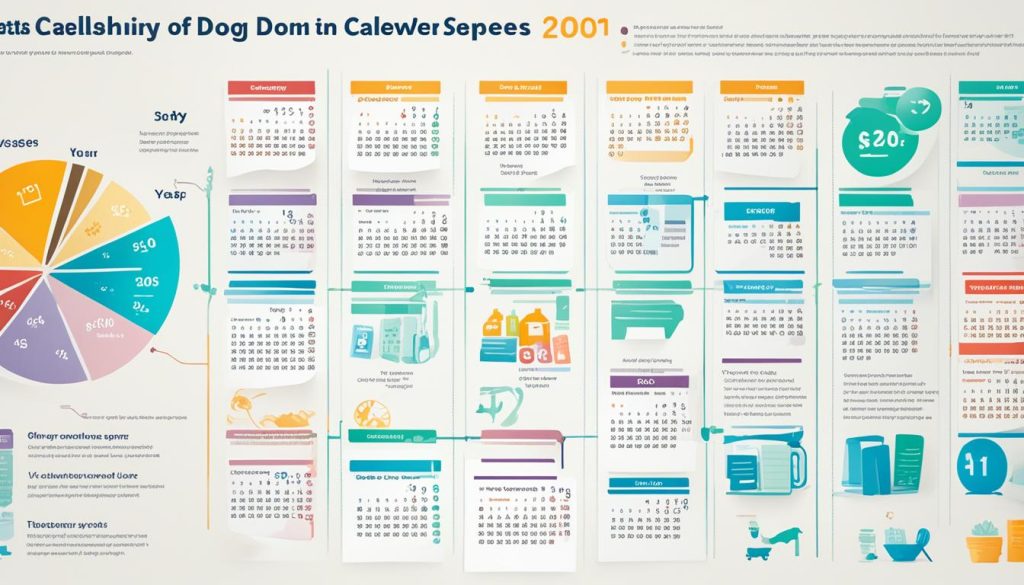Are you considering bringing a furry friend into your life? Owning a dog can bring immense joy and companionship, but it’s important to be aware of the financial responsibilities that come with it. From initial adoption or purchase fees to ongoing expenses like vet care and supplies, the cost of owning a dog can add up over time. In this article, I will provide insights and tips on calculating pet ownership costs, so you can make an informed decision about bringing a dog into your home.
How Much Does it Cost to Own a Dog
- The average annual cost of owning a dog is $4,512 or $376 per month.
- Initial expenses include adoption or purchase fees, vet care, and dog supplies.
- Ongoing annual expenses consist of food, toys, grooming, and veterinary care.
- Unexpected expenses and emergency situations should be prepared for.
- Despite the costs, the joy and companionship of owning a dog make it a worthwhile investment.
Breaking Down the Initial Expenses of Dog Ownership
When adding a new dog to your family, there are several upfront costs to consider. These costs play a crucial role in budgeting for a pet dog, as they can be two to three times the typical annual expense for the dog. Here’s a breakdown of the initial expenses you should be prepared for:
1. Purchase or Adoption Fees
Initial purchase or adoption fees vary depending on several factors, including the breed and location. Costs can range from $100 to $2,500, so it’s essential to research and find the right dog within your budget.
2. Veterinary Care
Your new furry friend will require comprehensive veterinary care, including vaccines and spaying/neutering. This can cost between $375 and $1,875, depending on the services and your location.
3. Dog Supplies
Other initial expenses include purchasing essential dog supplies. These may include food, a bed, leash, collar, and toys. The specific cost of these supplies will depend on the breed and size of your dog.
By understanding and planning for these initial expenses, you can effectively manage your pet care financial planning and ensure that you’re well-prepared to welcome a new dog into your family.

Ongoing Annual Expenses of Dog Ownership
After the initial expenses are covered, there are several ongoing annual expenses associated with owning a dog. It’s important to consider these costs when planning your dog ownership budget and estimating expenses.
Here are some key annual expenses to keep in mind:
1. Food
The cost of food for your dog can vary depending on the size and specific dietary needs of your furry friend. On average, dog owners can expect to spend between $200 and $700 per year on dog food. Higher-quality and specialized diets may be more expensive.
2. Toys and treats
Keeping your dog entertained with toys and rewarding them with treats is an essential part of their well-being. Budgeting an additional $75 to $250 per year for toys and treats can ensure your dog stays mentally stimulated and happy.
3. Collars, leashes, and accessories
Collars, leashes, and other accessories are necessary items for every dog owner. Depending on your preference and the needs of your dog, you can expect to spend between $50 and $600 per year on these essentials.
4. Regular grooming
Grooming is an important aspect of maintaining your dog’s overall health and hygiene. The cost of grooming can vary based on factors such as the breed and size of your dog. On average, dog owners can budget between $200 and $500 per year for grooming services.
5. Annual veterinary care
Regular veterinary care is crucial for the well-being of your dog. This includes annual exams, vaccines, and lab work. On average, dog owners can expect to spend between $200 and $500 per year on veterinary expenses.
6. Preventative medications
To protect your dog from common parasites such as heartworms, fleas, and ticks, preventative medications are necessary. The cost of these medications can range from $100 to $500 per year, depending on your dog’s size and the specific medications recommended by your veterinarian.
It’s also important to factor in any additional expenses that may arise, such as dog walking services or pet boarding for times when you are away. These expenses can vary and should be included in your dog ownership financial planning.
By considering these ongoing annual expenses and estimating the dog ownership costs, you can ensure that you are financially prepared to provide your dog with the care and love they deserve throughout their lifetime.

Unexpected Expenses and Emergency Situations
In addition to the regular expenses, owning a dog can sometimes come with unexpected costs. Emergencies happen, and when they do, it’s important for pet owners to be financially prepared. Unexpected expenses can arise from various situations, such as accidents, sudden illnesses, or unforeseen conditions.
Emergency veterinary visits, for example, can range from $1,000 to $5,000 depending on the severity of the situation. These visits often involve immediate care and can include diagnostic tests and treatments to stabilize your dog’s condition.
If your dog requires a lengthy hospital stay due to an illness or injury, you can expect costs to range from $1,000 to $3,000 or even more. This may include extended monitoring, specialized treatments, and medication.
In more severe cases, surgeries may be necessary to address serious health issues or injuries. The cost of surgeries for dogs can range from $5,000 to over $10,000, depending on the complexity of the procedure and additional factors.
Prioritizing Your Pet’s Well-being
To ensure the well-being of your dog and mitigate the potential financial burden of unexpected expenses, it is recommended to plan ahead. One option is to consider purchasing pet health insurance, which can help cover the costs of emergency vet visits, hospital stays, and surgeries. Pet health insurance plans vary, so it’s important to research and compare options to find the best fit for your dog’s needs and your budget.
Another proactive step is to set up a savings account specifically for pet care emergencies. By regularly setting aside money for unexpected expenses, you’ll have a financial safety net in place should an emergency arise. It’s always better to be prepared financially, as it allows you to focus on your dog’s immediate needs without additional stress or worry.
Remember, unexpected expenses are a reality of pet ownership, and it’s essential to be prepared. By considering the potential costs and making financial arrangements, you’ll be able to provide the necessary care for your furry friend during unexpected situations. Taking proactive steps to protect your pet’s health and well-being will give you peace of mind and ensure that you can continue to provide the love and support that your dog deserves.
Conclusion
Owning a dog requires careful consideration of the financial responsibilities involved. The average lifetime cost of dog ownership can exceed $30,000, with expenses varying across states. However, the joy and companionship that dogs bring make it a worthwhile investment for many individuals and families. By conducting thorough research, budgeting appropriately, and being prepared for unexpected expenses, you can provide the best care for your furry friend while effectively managing your finances.
It is important to understand the costs associated with owning a dog before welcoming one into your home. From initial adoption or purchase fees to ongoing expenses like food, medical care, grooming, and dog supplies, the ownership expenses can add up. By budgeting for these costs and considering the size and needs of the dog, you can estimate the annual expenses more accurately.
Additionally, unexpected expenses and emergency situations can arise during your dog’s lifetime. Emergency veterinary visits, extended hospital stays, and surgeries can lead to significant financial burdens. To prepare for these situations, pet owners should consider options like pet health insurance or setting up a dedicated savings account for pet care emergencies.
While owning a dog requires financial commitment, the rewards far outweigh the costs. By responsibly managing your pet ownership expenses and planning for the unexpected, you can create a loving and fulfilling environment for your canine companion while maintaining financial stability.






